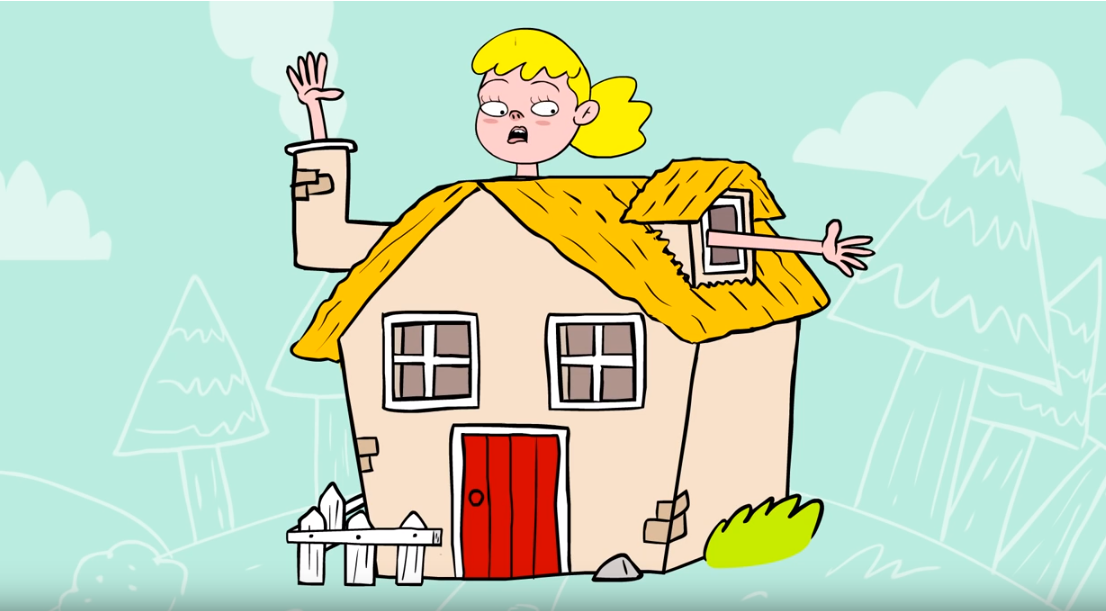Top Signs Girls are in Puberty
UPDATED VIDEO: We heard your voices! Thank you! Check out the updated version of this video: Pimples and Periods: A Puberty Guide.
Puberty in girls can start between the ages of 8 and 14 years old. Regardless of age, everyone goes through it eventually. [AMZ-009]
Girls in Puberty
Girls in puberty experience physical, emotional, and social changes.
Top Signs in Puberty
The most noticeable physical and emotional changes are:
-
- change in height
- wider hips
- breast development
- menstruation
- acne
- hair growth
Youth
If you’re between the ages of 9 and 14, you’ve probably started to experience puberty, or the changes that happen when your body changes from a child to a young adult. Then again, you may not have. Either way, don’t worry. Puberty in girls can start as early as age 8 and as late as 13 or 14, but eventually everyone goes through it!
FAQs
There are no set changes that happen for everyone. Some girls begin with growth spurts during which they grow taller. For others, the first sign may be that their breasts begin to grow or hair starts to grow under their arms and in their pubic area.
During puberty, girls begin to get their menstrual periods. Menstrual periods are when a small amount of blood and tissue leave the body through the vagina over the course of a few days. It happens about once every month and can last from a couple of days to a week. Some girls have cramps during their periods while others don’t. Girls commonly use a maxi pad, tampon or feminine hygiene cup to manage the blood that leaves their body during a period.
When a girl gets her first period, it signals that her body has begun ovulating. Ovulation happens once a month when a hormone or chemical in the body signals a girl’s ovaries to release an egg or ovum. This means that if a girl has unprotected sex she could become pregnant. The hormone estrogen is also released to signal to the girl’s uterus to build up its lining. If after sex an egg is fertilized by a sperm, the fertilized egg will implant in the lining and cause a pregnancy. If an egg is not fertilized within 12 to 24 hours after ovulation, the egg dies and disintegrates. Two weeks later, when the uterus realizes there is no fertilized egg, the built-up lining of the uterus is released, or shed, during a girl’s menstrual period.
Boys often begin puberty a little later than girls. Below are some common changes boys go through during puberty:
- Growing hair on the face, under the arms and in the genital area
- Growing taller
- Broadening shoulders
- Deepening voice
- Having frequent and at times spontaneous erections
Possibly experiencing wet dreams, meaning ejaculating semen while sleeping. (This is normal if it happens and normal if it does not.)
Parents
Girls go through a process called puberty, during which their body experiences many changes in order to allow it to physically reproduce and become an adult.
One change is that girls begin to get their menstrual periods. Menstrual periods occur once a month and can last from a few days to a week. Some girls have cramps during their periods while others do not. It’s important for girls to understand that their first period signals the beginning of ovulation and their body’s ability to get pregnant if they were to have unprotected sex. Once a month, a hormone in the girl’s brain signals her ovaries to release an egg or ovum (a process called ovulation). The hormone estrogen is also released to signal the girl’s uterus to build up its lining. If an egg is not fertilized within 12 to 24 hours after ovulation, the egg dies and disintegrates while still in the uterine tube. Two weeks later, when the uterus realizes there is no fertilized egg, the built-up lining of the uterus is released or shed during a girl’s menstrual period.
There are many other physical, emotional and social changes of puberty as well, and it generally takes five to seven years for all of the changes to be complete. Additional physical changes of puberty include a growth spurt during which girls become taller as well as hair growth under their arms, on their legs and around their genitals. Their genitals will grow in size as their whole body grows larger. They may also experience acne, and their sweat may now have a strong odor.
There are also emotional changes during puberty, including mood swings, experiencing sexual feelings, being interested in other people in a new romantic and/or sexual way and often feeling a need for more privacy from parents and/or siblings.
It is important for caring adults to explain the changes of puberty to young women before and while they are going through them. It is also essential to assure them that these changes are normal. Helping young people identify ways to cope with these changes can make this stage of life less stressful. Talking about these changes with the young people in your life lets them know that they are not alone and can come to their parents or guardians if they have questions or need support.
CONVERSATION STARTERS
It’s essential that you have conversations about topics like puberty if your child is to know that she or he can come to you with questions. The easiest way to start these conversations is to talk about issues as they come up in everyday life, like while watching TV together.
Some topics, like masturbation, may not come up in regular conversation, but it’s important to bring them up anyway. During puberty, girls, just like boys, begin to have new sexual feelings. Some begin to masturbate. It is normal if they do and also normal if they don’t.
Below are some ways to start these conversations:
When she mentions a friend you know, you can say, “Wow, Amber has really developed this year.” You can then use this time to talk about how different people go through puberty at different ages.
When you get home and unpack the groceries, tell your daughter that you bought these for her. Explain that you know that she hasn’t gotten her period yet and that it may still be awhile, but you want her to know that these things are here for her when she needs them. You can go on to talk more about how to use them and/or tell her you are always there for her, whenever she wants to talk more about these things.
Educators
Girls go through a process called puberty, during which their body experiences many changes in order to allow it to physically reproduce and become an adult.
One change is that girls begin to get their menstrual periods. Menstrual periods occur once a month and can last from a few days to a week. Some girls have cramps during their periods while others do not. It’s important for girls to understand that their first period signals the beginning of ovulation and their body’s ability to get pregnant if they were to have unprotected sex. Once a month, a hormone in the girl’s brain signals her ovaries to release an egg or ovum (a process called ovulation). The hormone estrogen is also released to signal the girl’s uterus to build up its lining. If an egg is not fertilized within 12 to 24 hours after ovulation, the egg dies and disintegrates while still in the uterine tube. Two weeks later, when the uterus realizes there is no fertilized egg, the built-up lining of the uterus is released or shed during a girl’s menstrual period.
There are many other physical, emotional and social changes of puberty as well, and it generally takes five to seven years for all of the changes to be complete. Additional physical changes of puberty include a growth spurt during which girls become taller as well as hair growth under their arms, on their legs and around their genitals. Their genitals will grow in size as their whole body grows larger. They may also experience acne, and their sweat may now have a strong odor.
There are also emotional changes during puberty, including mood swings, experiencing sexual feelings, being interested in other people in a new romantic and/or sexual way and often feeling a need for more privacy from parents and/or siblings.
National Sex Education Standards
Explain the physical, social, and emotional changes that occur during puberty and adolescence and how the onset and progression of puberty can vary
Describe how puberty prepares human bodies for the potential to reproduce and that some healthy people have conditions that impact the ability to reproduce
Explain common human sexual development and the role of hormones (e.g., romantic and sexual feelings, masturbation, mood swings, timing of pubertal onset)
International Technical Guidance on Sexuality Education
Discussion Questions
- What are some of the changes girls experience during puberty?
- Why do you think some girls go through puberty earlier than others?
- Why might some girls become anxious if their bodies aren’t developing as quickly as their friends’ bodies
- Why might some girls feel anxious if their bodies are developing more quickly than their friend’s bodies?
- Who are some trusted adults you can talk to if you have questions or concerns about puberty?





